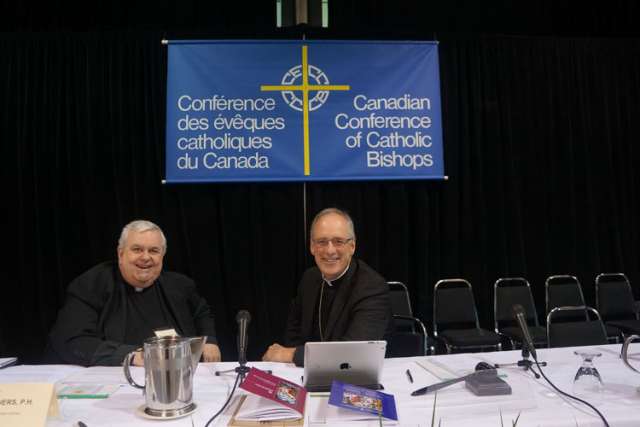Speaking at the annual plenary of the Canadian Conference of Catholic Bishops (CCCB), Archbishop Paul-André Durocher, the CCCB president, announced the national strategy to counter calls for euthanasia in the popular opinion, the courts and legislatures across Canada.
“It’s a campaign for palliative care and against euthanasia,” Durocher said in an interview. The CCCB president described it as an “educational campaign to get people to be aware of the difference between the two.”
The campaign called a “National Campaign for Palliative Care and Home Care, and Against Euthanasia and Assisted Suicide,” launches Sept. 28. It includes a flyer and website materials that bishops can use in their dioceses.
“We are promoting a vision of life, a vision of care of the dying. And that vision is best embodied in good palliative care,” Durocher said.
“The idea is to make the faithful conscious of what’s happening,” said COLF executive director Michele Boulva in an interview. “It’s designed to educate people and promote their responsibility as citizens to get in involved in the public debate and to defend life.”
Gatineau Archbishop Durocher said the CCCB website has added a new section on euthanasia and assisted suicide in its life and family section. He said the CCCB would launch a “campaign to combat the movement in Canada to facilitate access to euthanasia” with the help of the Catholic Organization of Life and Family (COLF) and the Euthanasia Prevention Coalition.
The new Catholic campaign arrives just before the issue lands at the Supreme Court of Canada. On Oct. 15 Canada’s highest court will hear an appeal of the BC Supreme Court decision in Carter v. Canada. In 2012 a British Columbia judge struck down Criminal Code of Canada provisions against doctor-assisted suicide.
A further legal fight is shaping up in Quebec, where the Liberal government of Dr. Philippe Couillard followed through on the previous Parti Quebecois government’s plan to make euthanasia legal. Quebec’s “Act Respecting End-of-Life Care” was passed in a 94-22 free vote in the Quebec National Assembly in June. It defines physician-assisted suicide as a form of health care and requires all Quebec health care institutions to draw up a plan and a code of ethics for provision of the service. Several court challenges have already been filed against the Quebec law.
A 2013 Environics poll found 71 per cent of Canadians in favour of assisted suicide — up from 64 per cent in 2000. Over the same period, Environics found the percentage of Canadians who disapprove of physician-assisted suicide had shrunk from 26 per cent to 19 per cent. A steady five-to-seven per cent said “it depends.” A 2012 Angus Reid poll showed 80% of Canadians support the right of terminally ill patients to have medical assistance to die.
Doctor opinion is harder to gauge. A consultation on the subject by the Canadian Medical Association found 71.5 per cent of doctors who responded supported the CMA’s existing opposition to assisted suicide, as opposed to 25.6 per cent who want the CMA to change its position.


